Yet another full Proms house sat down, and of course stood, for a rather strange six course meal which turned out not quite what the menu had led us to anticipate. While it was obvious that the rare and expensive bird dishes were going to be quickly over, the hors d’oeuvres in the shape of Mozart ballet music proved piquant but too many, and the real meat which we might have expected in Stravinsky’s Symphony in Three Movements appeared instead in a work too often mislabelled a soufflé, Ravel’s G major Piano Concerto, through the alchemy of masterchef soloist Jean-Efflam Bavouzet, who also served up a delicious surprise of his own.
Let’s be clear: without the suppleness of conductor Nicholas Collon (pictured below), who seems to wax ever more authoritative in clarity of intent with each concert he gives - the last was at the Proms on Sunday - and a certain leeway given to the highly artistic principals of the BBC Philharmonic, Bavouzet’s bird of paradise could not have flourished alone. Would the opening Allegramente stay more stately than usual? Not a chance; Bavouzet and Collon were far too sly and surprising for that.
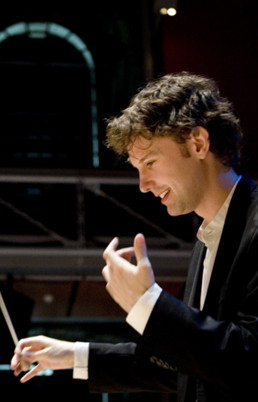 This is supposed to be the Ravel concerto with “no pretension to profundity”, as the programme note put it, unlike its overtly dramatic companion for left-hand piano only. Yet Bavouzet somehow dug deep into Ravel’s typically elusive transformation of Gershwinesque blues, kept his own space in flourishes and roulades and handed over to harpist Clifford Lantaff – bewitching in the big open spaces – and other instrumental soloists of equal imagination in the topsy-turvy shared cadenza (how many concerto rules Ravel so brilliantly subverts).
This is supposed to be the Ravel concerto with “no pretension to profundity”, as the programme note put it, unlike its overtly dramatic companion for left-hand piano only. Yet Bavouzet somehow dug deep into Ravel’s typically elusive transformation of Gershwinesque blues, kept his own space in flourishes and roulades and handed over to harpist Clifford Lantaff – bewitching in the big open spaces – and other instrumental soloists of equal imagination in the topsy-turvy shared cadenza (how many concerto rules Ravel so brilliantly subverts).
So we already had a centre of gravity simply capped by the middle-movement Adagio, with its gorgeously disorienting climax painting the hall’s walls psychedelic purple. The whole thing was dreamlike, unpredictable, unlike any performance you would have heard before - even Bavouzet’s own on CD which made me realize what I’d been missing from another, this time poker-faced French pianist. Bavouzet never just plays the notes; his encore - Gabriel Pierné's Etude de concert Op. 13, which sounded to me like Medtner - could have been virtuoso show-offery, but again cast the spell of unpredictability before the pianist finally leapt to his feet, sorcery achieved. What a difference he would have made to the Fourth and Fifth Prokofiev Concertos in last week’s marathon, the slightly heavy taste of which I’d swiftly washed down by turning to Bavouzet’s own recordings.
Collon is now a watchful master with an elegant and expressive technique; what you see is what you get, starting here with clean and well-projected Mozart. I suppose the idea here was that though it’s now fashionable in the opera house to include some of the ballet music which ends Idomeneo, we rarely get it all – and probably that’s right even though Mozart does a professional job at the two-thirds mark of a 25-minute sequence. Dances by Gluck or Rameau would have made a more inspired bet, spruce though this was.
It’s always surprising to find that one thing simply follows another, too, without obvious direction, in Stravinsky’s Symphony in Three Movements, all glistening sounds between the punchy rhythms and a fleeting expressiveness which Collon always got his strings and woodwind to underline. That was especially pointed in a central movement which seemed not so much suitable for the world of Franz Werfel’s awfully good film The Song of Bernadette, its original intended destination, as sketches for the pastoral idyll that kicks off The Rake’s Progress, still some way ahead in 1945 when the symphony was completed. Its more percussive aspects seemed less apt to the turbulent spirit of the age than sardonic character studies for the Rake’s resident devil, Nick Shadow.
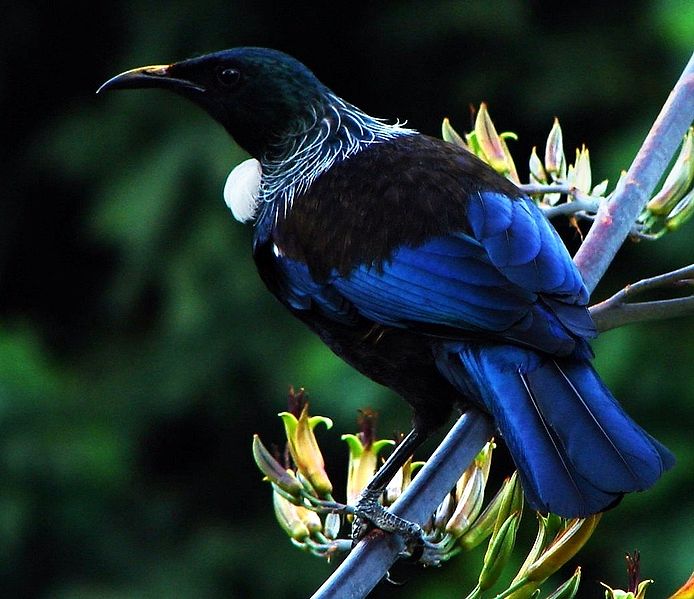 Was Collon too light? Here, possibly, not, only different from usual, but there could have been more dark underswell in the impressively fluid final curtain, Ravel’s La Valse. Perhaps it could have come straight out of Colin Matthews’s exquisite work on the only one of the Miroirs for piano the composer didn't score himself, "Oiseaux tristes” – a phenomenal achievement to take on perhaps the master orchestrator of all time and match him at his own game.
Was Collon too light? Here, possibly, not, only different from usual, but there could have been more dark underswell in the impressively fluid final curtain, Ravel’s La Valse. Perhaps it could have come straight out of Colin Matthews’s exquisite work on the only one of the Miroirs for piano the composer didn't score himself, "Oiseaux tristes” – a phenomenal achievement to take on perhaps the master orchestrator of all time and match him at his own game.
The other birdsong came from ornithological obsessive Olivier Messiaen, many of whose instrumental birds admittedly sound the same, to me at least, and proved a rare collector’s item, though its subject, the beautiful New Zealand tui bird (pictured above), is not. In orchestrating this movement Messiaen slated for his last orchestral work, Eclairs sur l’Au-déla… (Illuminations of the Beyond…), Christopher Dingle had a very good idea of the right sound – how often in Messiaen have we heard something very like it, which is not necessarily a good thing? 11 percussionists and six flutes for a three-minute piece, with attendant platform reshuffle needed before the next piece? Only at the Proms. And like everything else under Collon’s control, it sounded very gorgeous from a distance in this tricky space.
Read theartsdesk's reviews of other concerts from the BBC Proms 2015




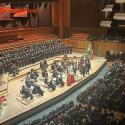







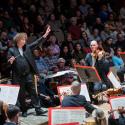
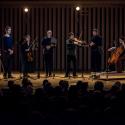
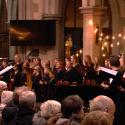
Add comment